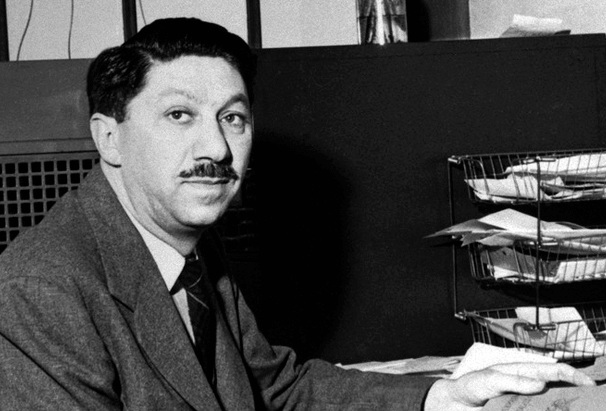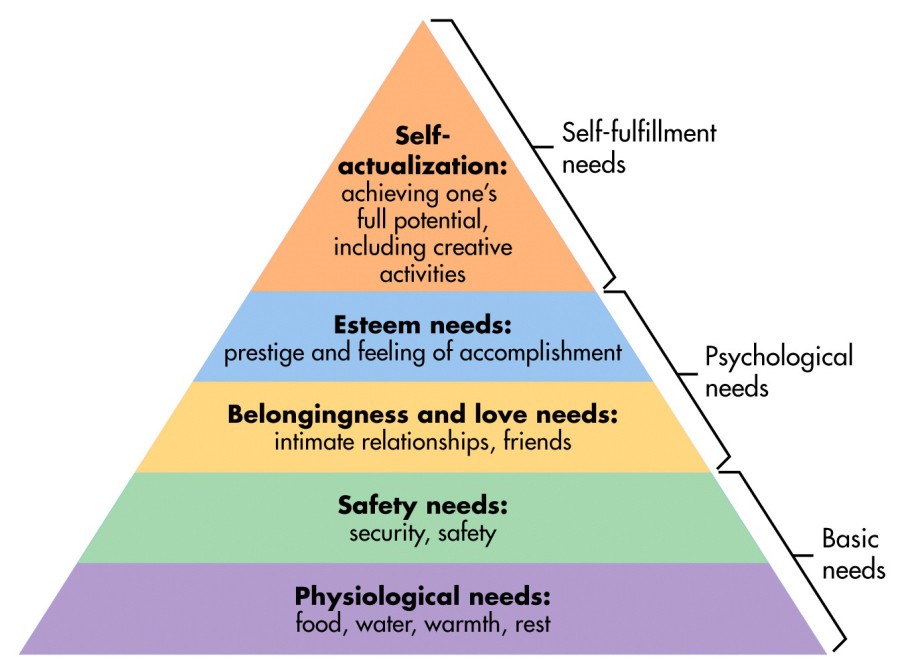What did Abraham Maslow—an atheist—and the Bible have in common?
Both support that life is a journey of actualization as people strive to reach their highest potential. Maslow urged people to pursue their needs and be intentional about this growth process.
If you plan on being anything less than you are capable of being, you will probably be unhappy all of the days of your life. (Abraham Maslow)
The Bible often encourages us to continually seek to become the best we can be.
Be diligent in these matters; give yourself wholly to them, so that everyone may see your progress. Watch your life and doctrine closely. (1 Timothy 4:15-16)

Human beings, Maslow believed, need to be connected to something bigger than themselves. He focused on our capacity for growth versus on what we do wrong, saying that we should yearn for self-actualization with the goal of maximizing our potential rather than striving for perfection.
He is most known for “Maslow’s Hierarchy of Needs” which is one of the most famous models of human motivation and behavior in history. He observed that there are certain needs humans have, and he arranged these needs in this hierarchical structure:

Many people familiar with Maslow focus on his early statements that basic needs lower in the hierarchy must be satisfied before individuals can attend to higher-level needs. Later, however, Maslow became flexible about the order in which people meet their needs, and he acknowledged the differences in individuals and circumstances in how they go about addressing them.
The Bible supports many of the same things Maslow did, but with some big differences.
The Bible recognizes that people have needs and seems to agree with those outlined by Maslow. But the Bible diverges from Maslow by positioning God rather than self as the primary focus of our actualization process. We are encouraged to pursue higher-level needs, even if that pursuit may sometimes be at the cost of our own basic needs.
Let each of you look not only to his own interests, but also to the interests of others. (Philippians 2:3-4)
And when Jesus is asked which of the commandments was most important, he replied:
Love the Lord your God with all your heart and with all your soul and with all your mind and with all your strength. The second is this: “Love your neighbor as yourself.” (Mark 12:30-31)
Both the Bible and Maslow placed strong focus on people’s innate desires to address the needs they face in their lives, and they urged people to actively strive to reach their highest potential.
But the question becomes: “How?”

How Do We Achieve Our Potential?
How do we become all we are meant to be, and how do we meet our needs at the same time?
Jesus gave us the answer for how to approach that challenge: “With all your heart and with all your soul and with all your mind and with all your strength.”
Named first in that list is: “With all your heart.” But what exactly does that mean?
In the Bible, the “heart” is considered the seat of life. It is where our soul, mind, and strength come together merging our emotions, spirit, thoughts, and will into the essence of who we are.
The heart houses our passions, desires, and affections. We can use it to set direction for our life. We do that by determining the things most important to us. In other words, we select our values, which become the beliefs we choose as our guiding principles and standards of behavior.
How do we use our heart to determine our values? It is an intentional process that we can perform that includes: discerning, deciding, and declaring:
Discerning our values – There are universal values that have been recognized for centuries by experts ranging from ancient philosophers to modern scholars. Why have these beliefs been identified and focused on for so long by so many wise people? Because they work.
In the STEPS Journey Blog article on “What Do You Yearn for in Life?” we saw that we all yearn for some of the same higher-level values, even if we aren’t aware of it. They include an ongoing search for: meaning, purpose, identity, contribution, and community.
In addition, Biblical teachings consistently urge us to align our higher-level values with God’s priorities (find meaning and purpose), becoming the best person we can be (defining our identity and contribution), and serving the needs of others (in community).
And proven wisdom from the world of recovery also reminds us to “get right with God, get right with ourselves, and get right with others.”
It bears noting that below these higher-level values there are basic values that also shape our behavior. In STEPS articles on “The New Normal: Lives of Quiet Desperation” and “The Dark of Night” we were reminded of the problems and pain people face in their lives. The struggle to meet those types of needs leads to a striving for basic values such as: security, well-being, and survival.
What is the point of this discussion? It is that we don’t have to figure out new values to align our lives around. Instead, we can more simply discern those that have been around for centuries.
Deciding our values – Once we have discerned the right values, we still have to make the intentional choice to adopt them as our own. In essence, we decide to make life better.
Declaring our values – Then, we need to put our values into action by declaring (at least, to ourselves) that we will align our lives to those beliefs as best we can.
Which brings us full circle, right back to Abraham Maslow.

How Do Our Values Meet our Needs?
Maslow said that people do what they do in order to meet their needs. And both Maslow and the Bible called out that we all yearn for some things that are bigger than us.
Could it be that the very values we yearn for will also meet our most critical needs?
Will those universal values help us maximize our potential and achieve actualization? And will they also address the problems and pain in our lives? The answer is, “Yes, if we use our heart and choose the right values.” And if we pursue them with all our heart, soul, mind, and strength.
We see how that works by aligning “Maslow’s Hierarchy of Needs” with the values we identified above that we yearn for. Below, we list which values address each of Maslow’s 5 types of needs:
Higher-level Needs
Self-actualization needs can be met as we aspire to …
- Meaning: We yearn to know why we are here rather than facing fear or hopelessness. To feel there is a cause—something—so big that we can gratefully surrender to it.
- Purpose: We yearn to be part of something larger than us, rather than smothering under a blanket of discouragement or insignificance.
Our role: Check our direction (our meaning and purpose) in life to confirm that we are on course for where we want to go in the long term, then adjust our direction as needed.
Esteem needs can be met as we search for …
- Identity: We yearn to be content and to feel comfortable with who we are rather than being burdened by guilt and shame.
- Contribution: We yearn for something bigger, to add value to the world rather than continue living with anxiety and discontent.
Our role: Check our behavior (our identity and contribution) by taking a daily inventory of how we are acting and making adjustments to be the best person that we can be.
Belonging needs can be met as we build …
- Community: We yearn to be accepted rather than remaining lonely and emotionally isolated. To have people who care for us, and to also care for them in an unselfish manner.
Our role: Check our relationships (our community), make amends when we have hurt someone, and invest the time and energy it takes to improve those connections.
Basic Needs
Safety needs can be met as we pursue …
- Security: We yearn for peace and stability and strive to avoid pain of worry or compulsivity.
Physiological needs can be met as we seek …
- Well-being: We yearn for relief from anxiety and depression and grow weary of our pain.
- Survival: We fear disease and death in all forms, both for ourselves and those close to us.
Maslow defined this hierarchy of needs, and it seems that the Bible supports our pursuit of them as well as the universal values that align to each one. As long as we do it the right way.
This is a powerful breakthrough to understand, that we can adopt a set of universal values that will not only help us reach our highest potential but that will address our deepest needs as well.
We must first use our heart to determine—discern, decide, declare—the higher-level values we will embrace such as: meaning, purpose, identity, contribution, and community.
Then, we can choose—one day at a time—to pursue those values with all our heart, soul, mind, and strength by aligning our lives to them. This is an important choice, and the stakes are high, because they include addressing our deepest needs and achieving our highest potential.
Each day, this can be simpler than we may think if we use our heart values to:
- Check our direction (get right with God).
- Check our behavior (get right with ourselves).
- Check our relationships (get right with others).
Which, when we step back and think about it, is a glorious challenge and a practical yet life-changing call to action. It’s how we keep taking next right steps.
Question: Are you willing to embrace the list of universal values listed above?
Next Right Step: Think of a next right step you will take after reading this article.
Share this article on: